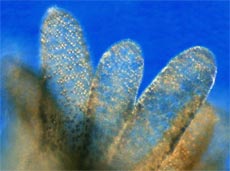Marine microbes are tiny organisms that live in marine environments and can only be seen under a microscope. They include cellular life forms, such as bacteria, fungi, algae and plankton, along with the viruses that freeload along with them.
"Viruses are the most abundant life form in the oceans...and if stretched end to end, would span farther than the nearest 60 galaxies." Curtis Suttle, University of British Columbia.
More than a billion microorganisms live in each litre of seawater─they dominate the abundance, diversity and metabolic activity of the ocean.
Microbes comprise 98 per cent of the biomass of the world's oceans, supply more than half the world’s oxygen and are the major processors of the world’s greenhouse gases, which means they have the potential to mitigate the effects of climate change.
Scientists are only just beginning to understand the important environmental roles that microbes play in marine systems─from feeding ecosystems to consuming waste and sequestering carbon. AIMS scientists are investigating several areas where microbial processes are central to issues of immediate concern to the world's coral reefs, including:
- indicators of ecosystem health and environmental impacts
- adaptation, acclimatisation and evolution of coral reef organisms in the face of global change
- marine microbiomes and viromes (the ecological communities of microbes and viruses, respectively).


